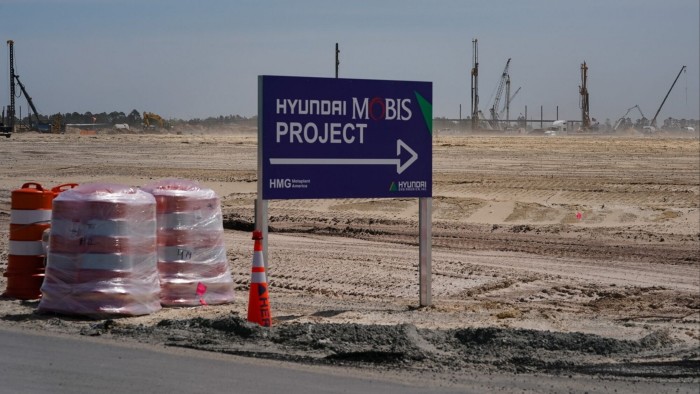Unlock the White House Watch newsletter for free
Your guide to what the 2024 US election means for Washington and the world
Hyundai Motor has named chief operating officer José Muñoz as the first foreign leader of the world’s third-largest carmaker, as the South Korean company gears up for Donald Trump’s second presidency.
Friday’s announcement that Muñoz would be co-chief executive came as shares in local battery makers LG Energy Solution and Samsung SDI fell more than 10 per cent in morning trading, after Reuters reported that the Trump administration was set to end a $7,500 subsidy for buying an electric vehicle in the US. Hyundai shares also edged lower.
The carmaker also named Sung Kim, a former US diplomat, as its president “to better prepare for uncertainties in the global business environment”, the company said on Friday.
“Muñoz is appointed as the first non-Korean CEO of Hyundai Motor . . . [and] is expected to enhance the company’s global management systems and further elevate its stature as a leading global brand,” the company added.
The unprecedented appointment of a foreigner to the top job comes amid growing concern over the incoming US administration threatening to impose higher tariffs on foreign goods and scrap the Inflation Reduction Act which offers tax credits for domestically produced batteries and clean vehicles. Hyundai and electric vehicle battery makers have invested heavily in the US to benefit from the $7,500 consumer tax credit for EV purchases.
“The hiring of foreign nationals is like an insurance policy as they brace for the second Trump administration,” said Lee Hang-koo, head of the Jeonbuk Institute of Automotive Convergence Technology in South Korea. “Relations with Washington have become much more important for Korean manufacturers as Trump plans to raise tariffs and eliminate the IRA tax credit.”
Trump has threatened to impose blanket 10-20 per cent tariffs on all trading partners, but analysts said the US needed to revise its free trade pact with South Korea to impose higher tariffs on Korean automakers. Trump has also threatened to impose 200 per cent tariffs on cars imported from Mexico, where Hyundai’s affiliate, Kia, has a factory.
Muñoz will join the other two chief executives — chair Euisun Chung and Lee Dong-seok — while current chief Chang Jae-hoon will be promoted to vice chair. The Spanish native is a US citizen and has led Hyundai’s US subsidiary since joining the carmaker in 2019. He was once considered for the top position at Japan’s Nissan Motor, following the ousting of chair Carlos Ghosn.
Sung Kim, a former US special representative for North Korea, will oversee global external affairs. He became Hyundai’s adviser in January to “support Hyundai’s response to global trade and policy and external networking”.
Hyundai, together with Kia, is the second-largest EV seller in the US after Tesla. Hyundai has invested $12.6bn to build an EV and battery cell plant in Georgia, which began operations in October, encouraged by the IRA provisions that are aimed at reducing China’s influence over the crucial EV supply chain.
Tesla supports ending the $7,500 subsidy, according to the Reuters report, believing it would devastate rivals such as Hyundai, while only having a slight effect on its own sales. Korean battery suppliers were also set to suffer.
“[Battery makers] are already in the red, excluding the tax credits they get. Their profitability will deteriorate further if Trump eliminates the credits when the EV market is already in a slump,” said Lee.


